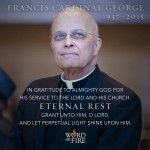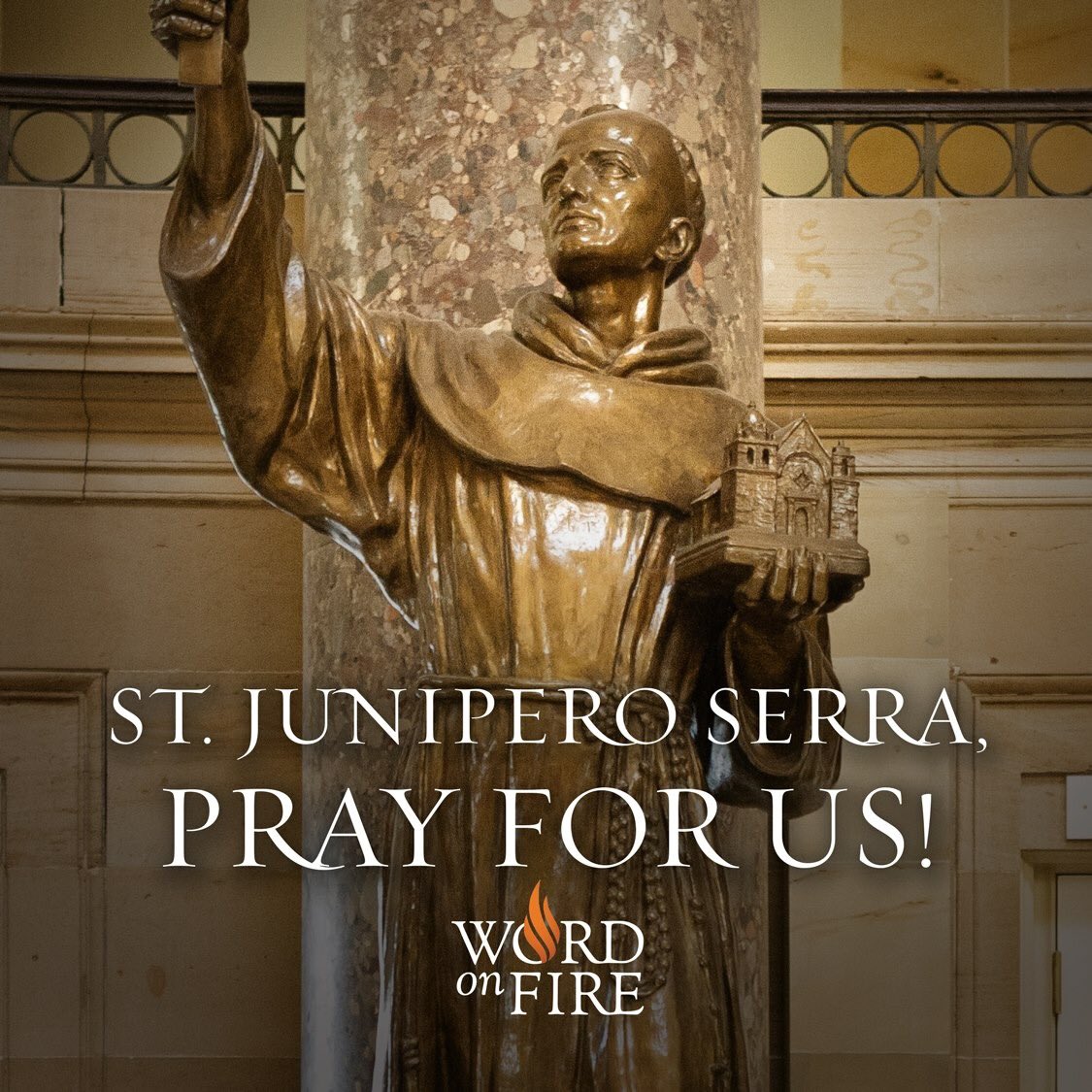1.
#PopeFrancis at Mass: A Christian "varnish" over a pagan lifestyle isn't Christianity. You must live what you believe.
— Catholic News Svc (@CatholicNewsSvc) April 20, 2015
(More from the homily here.)
2. Magnificat today has a meditation from the book Cum Clamore Valido. It serves as a good Monday examination of conscience and motivator:
[Jesus speaks:] I look for souls bowed down, souls whose will is so identified with my will that they no longer can do anything but cling to it, submit to it, bowing until they merge and disappear in it. And doing that before the least indication, before any manifestation of my good pleasure, of my divine preference.
If you want to unite yourself intimately with my inmost life, keep in mind that my life of intimacy with my Father has always been one of perfect accord with his paternal will. Will perfectly fulfilled and therefore fully glorified.
Meditate on this deeply so that you yourselves may become part of this in all its intimacy. Understand that “will perfectly fulfilled” means “food devoured and savored with the satisfying hunger and permeating flavor of love.” Food devoured with this avidness that takes and consumes all, leaving absolutely nothing.
Food savored with this sweetness and fullness of assent, where the enamored heart entirely takes its stance and from where it draws all its activity Totaliter, Libenter, Suaviter. Totally, Willingly, Sweetly.
Do all of you do this? Do you do it better and better each day?
Remember that the food of my will becomes divinizing only on condition of being devoured and savored, and that in the very proportion you do this you advance with me, by me and in me into the boundless, fathomless depths of divine intimacy.
These are the utterly crucifying paternal wishes that my truly consecrated ones devour with utmost ardor, in the measure that they cause the human me to die that these wishes become divinizing, satisfying, and therefore amiable, loving, utterly adorable.
Here is an effective way to examine how faithfully one adheres to what so pleases my heart: Nothing more, nothing less, nothing other than what my love wants, desires, prefers: “Nothing more,” because the more is often pride; “Nothing less,” because the less is almost always cowardice; “Nothing other,” because this is always a turning away from mortification and an egoistic attachment to one’s own views.
Rather: “All that I want: nothing but what I want, such as I desire and prefer it.”
[Subscribe to Magnificat monthly here.]
3. Today is an #OPPower day: the feast of Dominican saint Agnes of Montepulciano.
We might look at the Eucharist and think it only to be bread and the Mass to be mainly a community celebration. We might be concerned always with material things, worried about surviving and making our way in this world, in our jobs, studies etc; our prayers are thus principally about our earthly needs: food, money, jobs, good health and so on. All these are good but are they are limited transient goods. Today’s Gospel alerts us to the fact that there is more to our human existence than this world and its needs and joys – there is also the spiritual life and our relationship with God which is truly necessary because it relates to our eternal happiness. Thus Jesus says: “Do not labour for the food which perishes, but for the food which endures to eternal life” (Jn 6:27).
Hence, every now and again, certain saints alert us to this through their extraordinary lives. Theirs are lives so marked by infused grace that from an early age they seem to belong to the world to come rather than this world; they are so focussed on God and on attaining heaven. The 13th-century Dominican nun St Agnes of Montepulciano was one such saint and her life is a sign to us.
At the age of just 9, St Agnes entered a convent in Montepulciano. In fact, she’d been begging her parents to allow her to become a nun since the age of 6. At the age of just 15 she established her own convent with papal approval, and this became a Dominican convent. As prioress, St Agnes lived a life of ardent prayer with great humility, totally consecrated to God. And she did so because she loved Christ so deeply and loved humanity as he did. As St Catherine of Siena said: “She had a taste and a hunger for souls”, which is why she became a contemplative nun. For the contemplative life is only possible if there is a hunger for love, and if there is this graced realization that this love can only be satisfied by the Lord.
And so, consecrated religious, and especially saints like St Agnes are signs to all Christians of the primacy of the life of grace. Just as Christ wanted the people of his time to see the signs he worked and so come to believe in him and be saved, so it is in our time. Let us not miss the wonderful works that God does for us to lead us to salvation, namely the sacraments and Liturgy of the Church. Or perhaps Christ is calling you to consecrated religious life? These are not ordinary acts and should never be treated as such. Rather, they are extraordinary signs which are imbued with grace; they are the beautiful works of Christ himself through which he gives us a share in his Paschal Mystery, and unites us to the Blessed Trinity who is Love.
5. For some spiritual reading, her life, written by St. Catherine of Siena’s confessor.
6. Striving Like St. Stephen for the Food that Endures to Eternal Life
7. Pope Benedict XVI, who was elected ten years ago this past weekend:
Is there anyone who does not know Dostoyevsky’s often quoted sentence’. “The Beautiful will save us”? However, people usually forget that Dostoyevsky is referring here to the redeeming Beauty of Christ. We must learn to see Him. If we know Him, not only in words, but if we are struck by the arrow of his paradoxical beauty, then we will truly know him, and know him not only because we have heard others speak about him. Then we will have found the beauty of Truth, of the Truth that redeems. Nothing can bring us into close contact with the beauty of Christ himself other than the world of beauty created by faith and light that shines out from the faces of the saints, through whom his own light becomes visible.
8. Fr. Roger Landry on Cardinal George:
God made a great difference in the life of Francis George and through him and his faith-filled response to divine action also made a great difference in addressing several of the Church’s and the world’s biggest challenges.
(More Cardinal George links here.)
9. From the commentary on the first letter of Peter by Saint Bede the Venerable, in the Liturgy of the hours today:
You are a chosen race, a royal priesthood. This praise was given long ago by Moses to the ancient people of God, and now the apostle Peter rightly gives it to the Gentiles, since they have come to believe in Christ who, as the cornerstone, has brought the nations together in the salvation that belonged to Israel.
Peter calls them a chosen race because of their faith, to distinguish them from those who by refusing to accept the living stone have themselves been rejected. They are a royal priesthood because they are united to the body of Christ, the supreme king and true priest. As sovereign he grants them his kingdom, and as high priest he washes away their sins by the offering of his blood. Peter says they are a royal priesthood; they must always remember to hope for an everlasting kingdom and to offer to God the sacrifice of a blameless life.
They are also called a consecrated nation, a people claimed by God as his own, in accordance with the apostle Paul’s explanation of the prophet’s teaching: My righteous man lives by faith; but if he draws back, I will take no pleasure in him. But we, he says, are not the sort of people who draw back and are lost; we are those who remain faithful until we are saved. In the Acts of the Apostles we read: The Holy Spirit has made you overseers, to care for the Church of God which he bought with his own blood. Thus, through the blood of our Redeemer, we have become a people claimed by God as his own, as in ancient times the people of Israel were ransomed from Egypt by the blood of a lamb.
In the next verse, Peter also makes a veiled allusion to the ancient story, and explains that this story is to be spiritually fulfilled by the new people of God, so that, he says, they may declare his wonderful deeds. Those who were freed by Moses from slavery in Egypt sang a song of triumph to the Lord after they had crossed the Red Sea and Pharaoh’s army had been overwhelmed; in the same way, now that our sins have been washed away in baptism, we too should express fitting gratitude for the gifts of heaven. The Egyptians who oppressed the people of God, and who can also stand for darkness or trials, are an apt symbol of the sins that once oppressed us but have now been destroyed in baptism.
The deliverance of the children of Israel and their journey to the long-promised land correspond with the mystery of our redemption. We are making our way toward the light of our heavenly home with the grace of Christ leading us and showing us the way. The light of his grace was also symbolized by the cloud and the pillar of fire, which protected the Israelites from darkness throughout their journey, and brought them by a wonderful path to their promised homeland.
10.
All we do should be ordered toward receiving the Most Holy Eucharist because it is "the food that endures for eternal life”. #HomilyTweet
— Fr James Bradley (@FrJamesBradley) April 20, 2015












